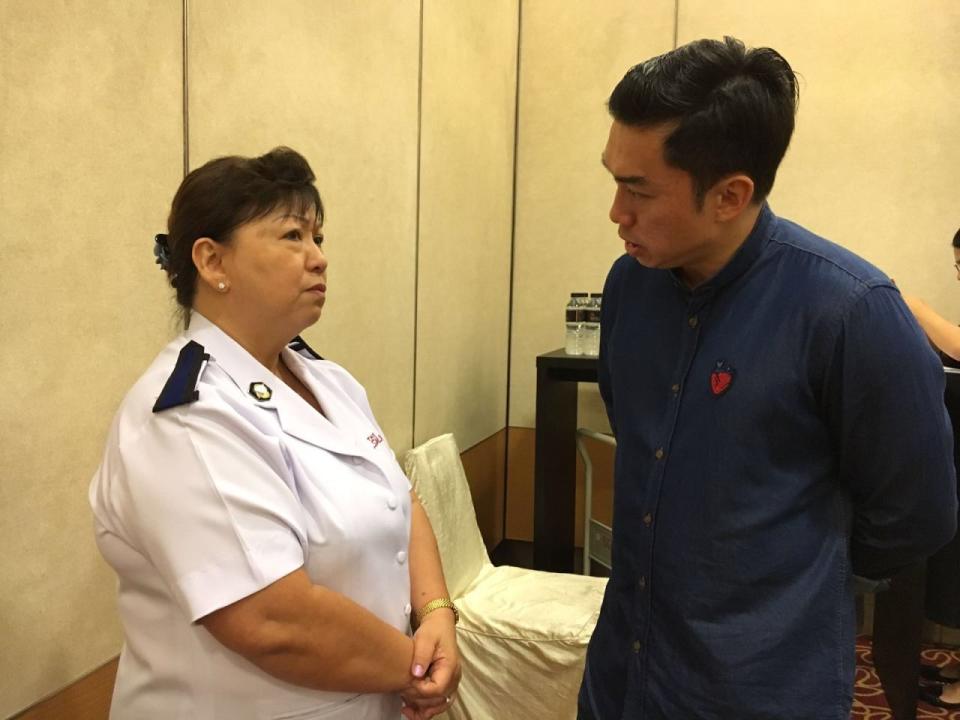Singapore nursing homes need new model of care: Lien Foundation CEO

Peacehaven nursing home executive director Low Mui Liang (standing), Lien Foundation CEO Lee Poh Wah (second from left) and Oliver Wyman partner Jeremy Lim (second from right) at the event. (Photo: Nicholas Yong/Yahoo Newsroom)
Single- or twin-bed rooms with their own toilets, a home-like environment and a team of senior care associates and nursing aides to look after residents.
This is the proposed “Silver Hope” model that the Lien Foundation and Khoo Chwee Neo Foundation said on Thursday (28 July) could be applied to Singapore’s nursing homes at an affordable cost.
Lien Foundation chief executive Lee Poh Wah noted that the new model amounted to a “fundamental change of religion”, as it gave nursing home residents autonomy and independence.
It was in stark contrast to the current “depersonalised and dehumanising” model of nursing home care, he said.
The two non-government organisations (NGOs) cited a study they commissioned from global strategy consultancy Oliver Wyman as the basis for their proposed model.
Titled “The Economics of Singapore Nursing Home Care”, the study looked to nursing homes in the US, UK and Japan, which are considered some of the leading countries in eldercare.
Oliver Wyman also consulted geriatricians, nursing homes and architects, as well as local health officials on an informal basis.
Nursing homes in Singapore currently house some 12,000 residents and typically have dormitory-style rooms with six to eight beds and shared toilet facilities. The government aims to have 17,000 nursing home beds by 2020 in anticipation of the Republic’s fast ageing population.
Oliver Wyman concluded that if the next 5,000 nursing home beds follow the “Silver Hope” model, it would cost an additional $19 million annually – or an additional $8 to $13 per resident per day.
Given that the number of people with dementia is expected to hit 100,000 by 2030, it added that the new model is “well-suited” to meet the needs of dementia patients.
Regarding who should bear the additional cost, Dr Jeremy Lim, a partner at Oliver Wyman and a former senior Ministry of Health (MOH) official cited the “very well-tested” model of shared responsibility, which states that those who can afford to should pay more, while those who cannot should receive help from the state.
‘We must renounce the current model’
The Oliver Wyman study comes in the wake of the proposed $15 million Jade Circle nursing home project, which was spearheaded by the two foundations and the Salvation Army’s Peacehaven nursing home. The project would have followed a model similar to Silver Hope.
According to The Straits Times, the project stalled late last year over the government’s refusal to provide patient subsidies. The MOH said at the time that providing ongoing subsidies would be difficult as the proposed parameters would be “hard to scale or be financially sustainable”.
The ministry also asked the group to convert the twin-bed rooms into four-bed rooms, which the group declined.
Lee was clearly still feeling the sting of the government’s “arbitrary” decision, telling reporters at the press briefing that he was “completely baffled” by it.
He said that the MOH had initially supported the concept, before doing an about-turn a year later.
“We were penalised for wanting to care for the poor, for delivering care that far exceeded MOH standards. (The government) inadvertently smothered innovation by perpetuating archaic models of nursing home care that will not meet rising public expectations,” said Lee.
In order to provide a constructive response to the stalled project, the two foundations initiated three studies, said Lee. The second study will be a qualitative study, while the Lien Foundation is also seeking public feedback on eldercare services and nursing homes.

Low and Lee speaking at the event. (Photo: Nicholas Yong/Yahoo Singapore)
Health ministry replies
Dr Lim is “quite optimistic” about the government’s response to the Oliver Wyman study, the results of which were sent to MOH on Wednesday (27 July).
“I can say with a lot of confidence that there is very strong alignment, that whether NGO, whether MOH, everyone wants the best outcomes for Singaporeans,” said Lim. “We all recognise that there are challenges with today’s model… things need to change. But change, in a typical Singapore process, is an evolutionary process.”
Responding to queries from Yahoo Singapore, MOH said that it “appreciates Lien Foundation’s efforts in commissioning this report” and hopes to “discuss the findings with (the foundation) and understand the assumptions behind the report’s economic analysis”.
Regarding the Jade Circle project, the ministry said that it “offered to provide financial support if part of the (facility’s) new capacity, not all, could be converted in to four bedded wards”, so as to have a “mix of room types to suit the needs of different patients”. It added that it is willing to consider extending its “portable subsidy scheme” to Peacehaven should the parties behind Jade Circle insist on keeping to having just one- or two-bed rooms.
Jenny Kwong, 41, who works in human resources, has an elderly mother with mild dementia. The elder Mrs Kwong has been attending daycare for a year, and her three daughters take turns to provide care for her.
Asked about the prospect of eventually placing her mother in a nursing home, Kwong said, “Our thought was always that our parents should be enjoying life with us. We are not sure if she can get the best care in these places. There may also be a language barrier because there are many foreign staff there.”
But Kwong was more enthused about the Silver Hope scheme, adding, “I feel more responsive to this. It definitely sounds better than what I have seen of the current nursing homes.”


